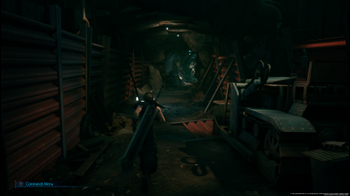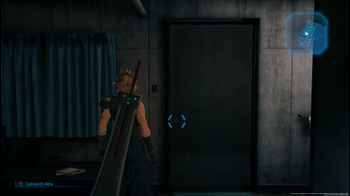Final Fantasy VII Remake Review
For many of us, the opening of Final Fantasy VII is not simply a childhood memory of yesteryear, but a formative gateway we've collectively passed through, leaving a lasting impression on our young and budding imaginations. While surely not everyone has that same immeasurable and intangible response to Squaresoft's magnum opus of 1997 -- certainly we weren't all middle schoolers at the time -- it is this monumental legacy that Final Fantasy VII Remake seeks to reinvent for a new generation.
And in many ways, it succeeds. It might not stick the landing, but it succeeds nonetheless.
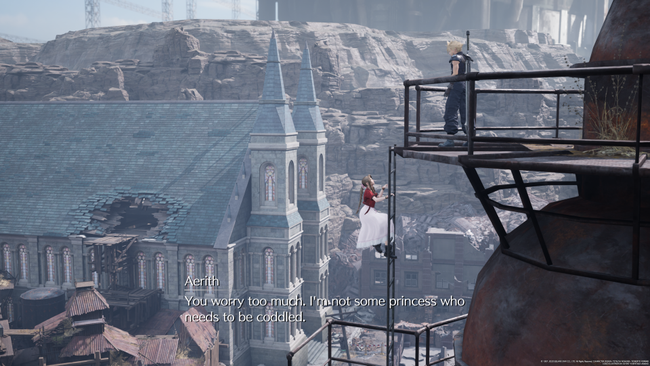
With the weight of a million degrees of expectations and years of hesitant anticipation, Final Fantasy VII Remake arguably stands with the deck stacked against it from the outset. Not only is this remake simply the first portion of an indeterminate number of parts comprising the original story, but Square Enix has sought to expand on abbreviated segments of the original as well. Not only are old and familiar characters, locations, and story beats meticulously recreated, but alongside are new aspects entirely, elaborating on minor facets of the original game in some cases and creating entirely novel ones in others. At their best, these new unfamiliar segments fit snugly beside the recognizable, effectively recreating and extending a brief segment of the original game with the sort of love and care that the most anxious of us thought might, unfortunately, be mishandled. Regrettably, however, the worst of the new additions are sadly uninspired, often mundane in execution and bordering on non-sensical at their very lowest.
Unlike Final Fantasy XV, which strongly latched on to the concept of providing an open-world playground arguably often to its detriment, Final Fantasy VII Remake clearly goes in the opposite direction for most of its runtime. From the outset, players are often deliberated shunted from story beat to story beat along a straightforward path, moving between combat arenas and boss fights and allowing a new and engrossing combat system to take center stage. While on paper this might seem to evoke the specter of the worst aspects of Final Fantasy XIII, in practice I found myself struggling to take any significant degree of issue with the format in this case, largely because I never really found myself growing weary of the encounters I was being shifted to despite it mostly all being incredibly straightforward.
To put it bluntly, the combat systems here are a joy to engage with and even more rewarding to master. Independent of anything else, I simply loved playing this game.
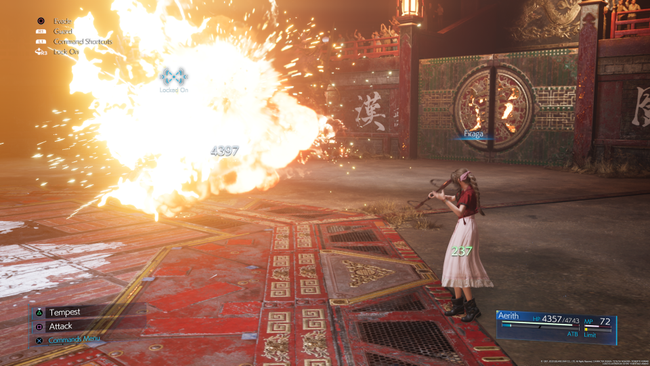
To clumsily describe the systems at work here at a surface level, imagine taking this action combat system of Kingdom Hearts III, slowing it down just a tad while incorporating some of the best mechanics of Final Fantasy XIII's stagger system, and finally throwing in a tiny bit of your favorite real-time-with-pause RPG. Altogether this results in deliberate, smart, and engaging combat that I find myself already anticipating the most ardent among us to break wide open in the coming months. As someone who firmly believes that abstracted turn-based combat systems (such as in Final Fantasy VII) can still be incredibly rewarding even in modern games, what Final Fantasy VII Remake provides leaves no question at all in my mind about moving away from mostly turn-based system of the original.
When engaging an enemy, you'll take control of one of the game's four party members, each with a unique and bespoke style in how they feel to play. Every character will have access to different default attacks, a set of unique abilities, as well as access to spells determined by their current equipped materia and weapons. At the core of the system is the Active Time Battle (ATB) gauge. Characters will earn up to two gauge 'charges' in battle passively and as they damage enemies, and later they'll also be earned as party members block attacks, stagger opponents, or other battle interactions as one progresses through the game.
ATB charges are used to interface with the combat in multiple ways. They can be spent to cast damaging spells to exploit an enemy weakness, use unique weapon abilities with various effects, or even to cure or revive fallen allies and use items. The result is that there is a wonderful sense of momentum that immediately feeds back into how well any given player is executing on the combat system altogether. Smart positioning to avoid damage, staggering foes to eliminate immediate threats, and generally staying on the offensive will result in ATB gauges readily filling rapidly, allowing the party to take control of combat of any given encounter with plentiful opportunity to utilize their full kit of abilities and emerge victorious.
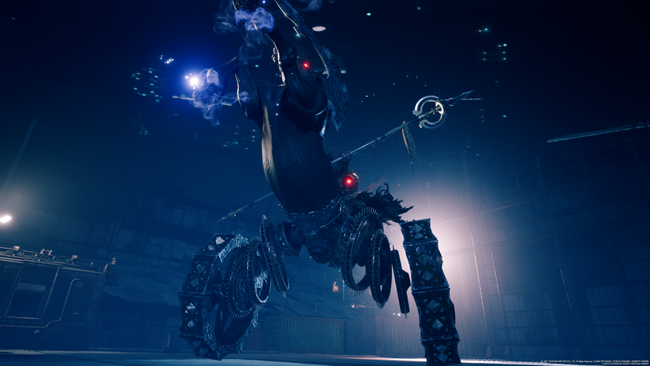
On the other hand, sloppy play, taking damage or getting stunned by an enemy animation that could have been avoided, or simply going into combat unprepared might instead have the player on their heels -- scrambling for that next gauge tick just for the ability to toss out a cure spell in panic, only to bottom back out on the gauge and desperately hope that you'll be able to shift the momentum back in your favor. It remains rewarding throughout the entire game to learn techniques and strategies for each party member, and to execute for that last-second stagger, allowing you to rack on the damage with your most powerful abilities while the opponent is momentarily helpless. Boss encounters are especially a highlight, usually nudging the player to implement certain approaches without outright stripping agency away from them in terms of requiring any one overly-specific strategy.
Cloud and Tifa are quick fighters, able to nimbly move around the battlefield while either dealing high amounts of raw damage or delivering a significant staggering blow to stop enemies in their tracks. Barret and Aerith often play more like traditional backline characters, dealing damage from a distance with spells (or bullets) and supporting the team from afar. No single character is railroaded into a particular role completely though, even Barret gets some powerful options for getting up close and personal, and nothing is stopping anyone from having Tifa be the party's main support specialist -- she can gain ATB gauges quickly, offering plenty of opportunities to throw out curative buffs if you're inclined. One niggling shortcoming is that I often found that I could not trust the game's automatic enemy selection to always target what I was most interested in fighting, especially as enemy models move in and out of the field of view, but this was largely alleviated by simply getting in the habit of hard locking onto any given target by clicking the right stick.
While battles themselves are fluid and fun, and I rarely found myself distracted by dips in performance during even the most intense of combat situations, I wish the same could be said for general environmental navigation. While I found myself okay with the largely linear progression of most of the game's locations -- a straightforward path punctuated by obvious dead ends holding onto treasure items, slowly squeezing under passageways and through small crevices gets tiring quickly, and consistently serve to upend the pacing between environments. While these might not really register the first time through a given area, they end up becoming especially cumbersome when retracing steps for completing side objectives later in the game.
That's because Final Fantasy VII Remake isn't entirely moving from battle arena to battle arena. As part of the overall vision of expanding on the brief introduction to the original game, there are few portions here and there in the remake where instead of closely following the established narrative, the game will periodically slow down and allow you to partake in side objectives and optional content. For instance, within a few hours of starting, players will find themselves mostly free to explore Sector 7 - Tifa and Barret's residence in Midgar - and get the opportunity to undertake side quests and, hopefully, immerse themselves in the livelihoods of the district's residents. While these diversions are serviceable in terms of providing some minor character interactions between the main cast, and of course giving more chance to engage in some combat, the presented opportunities here are often uninspired and fairly bland.
Quests will often ask the player to revisit nearby areas and fight minor variations of baddies that they've already encountered. The combat remains engaging throughout, which was enough on its own to motivate me to thoroughly complete these on my first playthrough, but I often found myself unenthused whenever I came across a new block of quests to undertake. While the best third of the quests do result in some admittedly neat engagements, you're just as likely to have to run around town interacting with charisma-lacking NPCs, chasing cats, or partaking in a simple minigame of limited scope without any lasting enjoyment. I wouldn't say that these sections of the game drastically drag the quality of the experience down, but they don't elevate anything either, and often feel like bloat. Any opportunity to give the main cast more screentime is a good thing in several respects, but slowly ducking under the same crawlspace a second and third time never feels good.
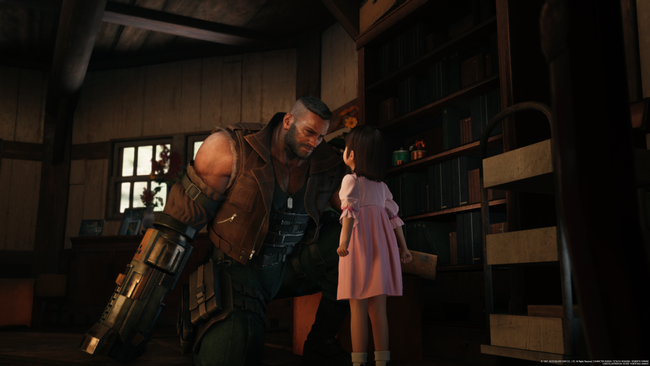
Especially present in these more open sections was a continual distraction of some blatant texture pop-in, which seemed to progressively get worse the further into the game I went. Walls and other surfaces would consistently pop in long after coming into view, with some surfaces remaining incredibly muddy entirely. Character models are often wonderfully expressive, and combat effects are flashy, fluid, and fun, but several environmental assets appear incredibly dated. Another footnote is that character dialogue volume was often balanced oddly, with subtitles often bailing me out by missing barely-audible voice lines from the main cast over the environmental effects or music, despite how many times I tried to adjust the in-game audio sliders. These are potential issues that could quickly be cleaned up with some post-launch TLC, but they remained an eye (and ear) sore throughout.
The second way that Final Fantasy VII Remake builds on the original is that certain chapters introduce new story elements and more chances to expand on the established plot of the original, and the results here are also sadly mixed. An early example of this is a chapter that gives more time to interact with the Avalanche crew that were barely characters in the original: Biggs, Jessie, and Wedge. While an expanded remake sounds like an absolutely perfect opportunity to round the trio out, provide new characterization, and flesh out what passed by in a matter of hours originally, some of the decisions made here simply left me scratching my head.
This new side story with the Avalanche trio starts out promising, providing new personal motivations for the team's members (Jessie, for the most part) and gives a bit of context for how Midgar's overarching mako policy intimately affects the city's citizens. Shortly thereafter though, the sidestory ends up riddled with clumsily placed awkward hijinks, such as Wedge having to distract a group of Shinra attack dogs by running around nigh-aimlessly and ending up getting shot in his rear end. This is all exacerbated by the introduction of a new SOLDIER named Roche, a charisma-vacuum nothing-character with no clear objective who disappears as quickly as he enters the stage, ending up forgotten for the rest of the game's runtime.
A similar addition is made in the back half of the game involving Don Corneo and Leslie, one of his new lackeys. The Remake abruptly tries to force the player to feel some empathy for Leslie's personal situation by quickly establishing a sad backstory within a single chapter, but it ends up falling quite flat due to how abruptly it's introduced and how poorly it intersects with the ongoing story at the time.
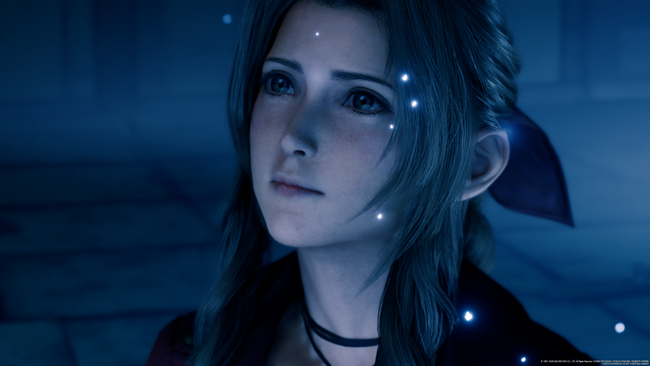
At the risk of sounding like a purist, Final Fantasy VII Remake is at its best when it's more faithfully adapting the original sections of Final Fantasy VII's opening chapter. This doesn't mean that every chance the game takes to add onto the original game is questionable. As a shining counterexample, Wall Market stands at the center of Final Fantasy VII Remake as a clear highlight of the game's vision to provide a more well-rounded and fleshed out experience, and even manages to incorporate characters and events both new and old in a way that feels appropriate and well-executed. Johnny, a footnote character from the original game, is given more time to interact with Cloud and company and even serves as a sort of intermediary for the player and the unique environment of Wall Market. He's played for laughs, admittedly, but acts as a sort of foil for Cloud's more stoic demeanor while both characters mosey around Wall Market determining the best courses of action to move the plot forward.
Wall Market also introduces new characters such as Madam M., Chocobo Sam, and Andrea Rhodea who effectively act as Don Corneo's governing arms in the near-lawless district. While the Remake doesn't give too much screentime to any one of these characters, their introductions feel believable, they play off of each other well, and are a testament to the fact that novel ideas can actually fit near seamlessly into the established plot without altogether upending it. It's just a shame that outside of this section of the game, similar attempts to embellish on the original often end up feeling much more hackneyed.
You see, Final Fantasy VII Remake, in many ways, doesn't seek to just retell the story of Final Fantasy VII with an updated look, modernized combat, and expanded narrative. Alongside the primary narrative throughline of the game is a series of new plot elements that seek to shift several implications of story that so many of us have been familiar with for over two decades. Best described as a sort of meta-narrative, Final Fantasy VII Remake often seems to assume that the player knows general plot beats of the original game already, and from early on in the Remake's retelling it becomes very clear that the door is being swung open for following entries to diverge from the established narrative to an even larger degree.
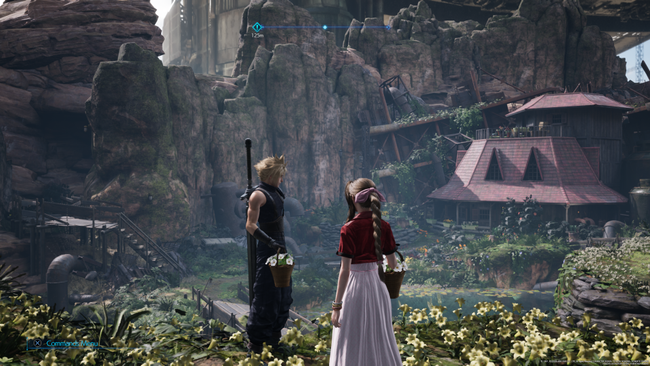
Final Fantasy VII, the original that is, was already a game that presented the player with a series of narrative threads in a non-chronological order, and then required that early revelations be reexamined and recontextualized from a new perspective once new information became apparent in the later parts of the game. While potentially confusing at its surface, it's part of the reason so many of us spent so many lunchtime hours thrilled to excitedly discuss the game with our peers and piece it all together when we were younger. Final Fantasy VII Remake's first tripped hurdle is a simple one: by dividing this effectively nonlinear narrative into (likely) discrete parts, so many of those important later revelations are simply left dangling here by the time you reach the credits. Flashbacks and plot teases are often faithfully given as they were in the original and in largely the same order, only to go unexplained, leaving new players relying on faith alone that they will hopefully be effectively elaborated on later.
On its own, this wouldn't be enough to wholly compromise the cohesiveness of Final Fantasy VII Remake. A few dangling plot threads could actually drive players to seek out potential future entries, providing a similar intrigue that drove us across the world map of the original in the first place in 1997.
Unfortunately, at its core, a key premise to the Remake is that it is almost self-aware of its own legacy, and not-so-subtly hints to the player that it knows you know, too (even if you don't). I'm not exactly certain how a player completely new to Final Fantasy VII, heading into the Remake with little or no prior knowledge, will effectively parse what's presented here. On one hand, flashbacks and visions hint at past events that new players won't be aware of are presented nearly as they originally were, promising to be later followed up on -- only now their elaboration lies behind a future entry that's certainly years away instead of a few hours past the opening segment. By introducing new elements interwoven within and on top of that, the result is a story much more muddied. Final Fantasy VII Remake winks hard, blatantly so, at longtime fans, especially by the back half of the game.
Despite some misgivings about some of the liberties taken, Final Fantasy VII Remake is an admirable foundation to build off of for future entries, especially in terms of its standout combat and some wonderful examples of building on the premises of the original game. Fans familiar with Final Fantasy VII should enjoy numerous moments of unbridled and unashamed nostalgia of revisiting their favorite places and characters under a new light, while newcomers should get just enough of a glimpse as to how and why so many were originally captivated long ago.
